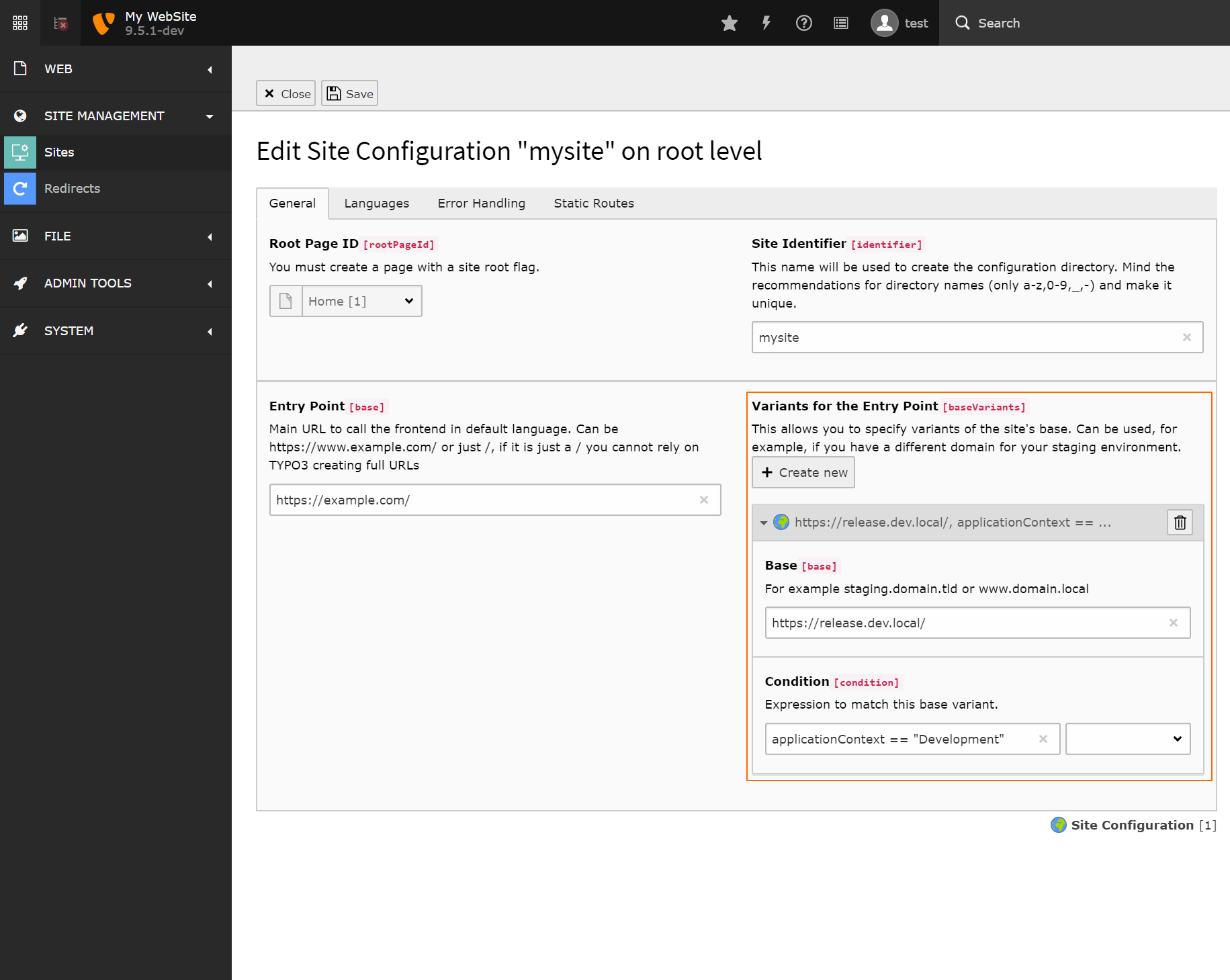Attention
TYPO3 v9 has reached its end-of-life September 30th, 2021 and is not maintained by the community anymore. Looking for a stable version? Use the version switch on the top left.
You can order Extended Long Term Support (ELTS) here: TYPO3 ELTS.
Base Variants¶
In Site Handling base variants represent different bases for a web site depending on a specified
condition. For example a "live" base URL might be https://example.org but on local machine
it's https://example.localhost as a domain - that's when variants are used.
Base variants exist for languages, too. Currently these can only be defined
through the respective *.yml file, there is no UI available yet.
Variants consist of two parts:
a base to use for this variant
a condition that decides when this variant shall be active
Conditions are based on Symfony Expression Language and allow flexible conditions. For example:
applicationContext == "Development"
would define a base variant to use in Development context.

A configured base variant for development context.¶
Hint
For those coming from earlier TYPO3 versions: With site handling, there is no need for sys_domain records anymore! :)
The following variables and functions are available in addition to the default Symfony functionality:
Example¶
rootPageId: 1
base: 'https://example.org/'
baseVariants:
-
base: 'https://example.localhost/'
condition: 'applicationContext == "Development"'
-
base: 'https://staging.example.org/'
condition: 'applicationContext == "Production/Sydney"'
-
base: 'https://testing.example.org/'
condition: 'applicationContext == "Testing/Paris"'
languages:
-
title: 'Global'
enabled: true
languageId: '0'
base: /
typo3Language: default
locale: en_UK.UTF-8
iso-639-1: en
navigationTitle: English
hreflang: gb-en
direction: ''
flag: gb
-
title: 'DE'
enabled: true
languageId: '1'
base: https://example.de/'
baseVariants:
-
base: 'https://de.example.localhost/'
condition: 'applicationContext == "Development"'
-
base: 'https://staging.example.de/'
condition: 'applicationContext == "Production/Sydney"'
-
base: 'https://testing.example.de/'
condition: 'applicationContext == "Testing/Paris"'
typo3Language: de
locale: de_DE.UTF-8
iso-639-1: de
navigationTitle: Deutsch
hreflang: de-de
direction: ''
fallbackType: strict
flag: de
Properties¶
typo3.version¶
- Datatype
string
- Description
The current TYPO3 version
- Example
9.5.0
typo3.branch¶
- Datatype
string
- Description
The current TYPO3 branch
- Example
9.5
typo3.devIpMask¶
- Datatype
string
- Description
The configured devIpMask taken from
$GLOBALS['TYPO3_CONF_VARS']['SYS']['devIPmask']- Example
77.176.160.*
applicationContext¶
- Datatype
string
- Description
The current application context
- Example
Development
Functions¶
All functions from TYPO3s DefaultFunctionsProvider are available:
ip¶
- Datatype
string
- Description
Match an IP address, value or regex, wildcards possible. Special value:
devIpfor matchingdevIpMask.- Example
ip("77.176.160.*")
compatVersion¶
- Datatype
string
- Description
Match a TYPO3 version
- Example
compatVersion("9.5.0"),compatVersion("9.4")
like¶
- Datatype
string
- Description
Comparison function to compare two strings. The first parameter is the "haystack", the second the "needle". Wildcards are allowed.
- Example
like("foobarbaz", "*bar*")
getenv¶
- Datatype
string
- Description
Wrapper for PHPs
getenv()function. Allows accessing environment variables.- Example
getenv("TYPO3_BASE_URL")
date¶
- Datatype
string
- Description
Get the current date in given format.
- Example for checking the current month
date("j") == 7
feature¶
- Datatype
string
- Description
Check whether a feature ("feature toggle") is enabled in TYPO3.
- Example
feature("TypoScript.strictSyntax")
traverse¶
- Datatype
array and string
- Description
This function has two parameters: - first parameter is the array to traverse - second parameter is the path to traverse Syntax.
- Example
traverse(request.getQueryParams(), 'tx_news_pi1/news') > 0
